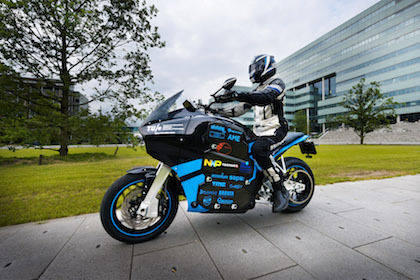Cohda Wireless technology travels around the world

Two electric motorbikes undertaking an 80-day around-the-world journey have been equipped with vehicle communication technology designed by Australian company Cohda Wireless.
On 14 August, STORM Eindhoven, a team of 23 students from Eindhoven University of Technology in the Netherlands, set off with these electric motorbikes on a round-the-world trip.
Aiming to cover 26,000 km in 80 days, the student-built motorbikes contain Cohda MK5 On-Board Units which enable V2X (vehicle-to-vehicle and vehicle-to-infrastructure) communications. As well as monitoring motorbike performance during the journey, Cohda plans to demonstrate how the system can improve vehicle safety and traffic efficiency in cities with the required infrastructure installed.
Cohda Wireless’ vice president of business development, Bernd Luebben, said, “Cohda’s MK5 On-Board Units allow real-time communication to ensure the motorbikes perform according to design and meet this demanding schedule. We also plan to support V2X demonstrations in cities such as Shanghai, where we have V2X units installed.”
The STORM World Tour began in the southern Netherlands city of Eindhoven, starting a route that circumnavigates the Northern Hemisphere. The participants will then leave Europe via Central Asia and cross North America before they return home.
Each electric motorbike has a top speed of 160 km/h and can travel 380 km before requiring a recharge. The student-designed batteries are in 24 separate cartridges and can store up to 28.5 kWh of energy. They can also be replaced by a fully charged battery pack within seven minutes.
Each day, the students will recharge batteries from the local power grid at companies, universities or homes en route. The team will also take part in events that show the potential of electric mobility.
$6.1m in govt funding to improve NSW rural connectivity
The funding will improve connectivity to around 1500 premises across the central west and...
Govt funds comms for Navy, Wi-Fi for evacuation centres
The government is upgrading communication systems on Royal Australian Navy ships, and also...
Call to standardise physical security of comms infrastructure
A new white paper from TCCA seeks to catalyse the creation of a global standard for the physical...





